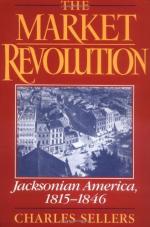
|
| Name: _________________________ | Period: ___________________ |
This test consists of 15 multiple choice questions and 5 short answer questions.
Multiple Choice Questions
1. Who did the public feel hostility toward, according to Sellers?
(a) Elites.
(b) Foreigners.
(c) Immigrants.
(d) Slaves.
2. How does Sellers characterize labor in Jackson's America?
(a) Expensive.
(b) Organized.
(c) Inexpensive.
(d) Rare.
3. What does Sellers say would be the result of expanding markets?
(a) Distribution of wealth.
(b) Restricting the creation of wealth.
(c) Proletarian uprisings.
(d) Concentration of wealth.
4. When does Sellers date the beginning of the Jacksonian era?
(a) 1824.
(b) 1812.
(c) 1832.
(d) 1828.
5. What did the Supreme Court effectively decide, which helped expansionism?
(a) Unconstitutionality of regulation.
(b) States rights.
(c) Institutionalization of laissez-faire capitalism.
(d) Federal supremacy over the states.
6. What does Sellers say happened to debtors when the economic crashed?
(a) They were overwhelmed by depreciating currency.
(b) They lost their fortunes.
(c) They were able to buy land extremely cheap.
(d) They were left with worthless promissory notes.
7. Where did DeWitt Clinton come from?
(a) Kentucky.
(b) New York.
(c) Massachusetts.
(d) Virginia.
8. How did the Second Great Awakening affect Jackson's America, according to Sellers?
(a) Harsher penalties for witchcraft.
(b) Stronger Protestantism.
(c) Wider array of pagan religions.
(d) Stronger Catholicism.
9. What was the condition of the U.S. in Jackson's time?
(a) Mostly open territory.
(b) Mostly Eastern seaboard territory.
(c) Mostly settled territory.
(d) Mostly agricultural territory.
10. To what does Sellers attribute the rise in democratic sentiment?
(a) The people's desire for stability.
(b) The people's desire for cheaper goods.
(c) The people's desire for peace.
(d) The people's desire for western expansion.
11. How did the Republicans plan to stay in power, according to Sellers?
(a) By setting the people against the elite bankers.
(b) By pitting the farmers and planters against each other.
(c) By uniting farmers and planters.
(d) By promising to raise tariffs.
12. Who brought Thomas Jefferson to power?
(a) Anti-commercial landowners.
(b) Factory owners and investors.
(c) Capitalist merchants.
(d) Freed slaves.
13. Who would normally have prevented economic revolution from changing people's lives?
(a) The manufacturers.
(b) The people.
(c) The government.
(d) Slaves.
14. How long did the order that came out of the Jacksonian era last, according to Sellers?
(a) Until the Great War.
(b) Until the Civil War.
(c) Until the present.
(d) Until World War II.
15. What faction became particularly powerful as a result of Republican policies?
(a) Southern agriculturalists.
(b) New York commercial interests.
(c) Western railroads.
(d) Northern manufacturers.
Short Answer Questions
1. Who became Speaker of the House under James Monroe?
2. Where did reformers look for a model of how society could be?
3. How does Sellers say the Supreme Court used its power?
4. Where was Andrew Jackson nominated for President?
5. What force does Sellers say created political pressure from the South?
|
This section contains 440 words (approx. 2 pages at 300 words per page) |

|




